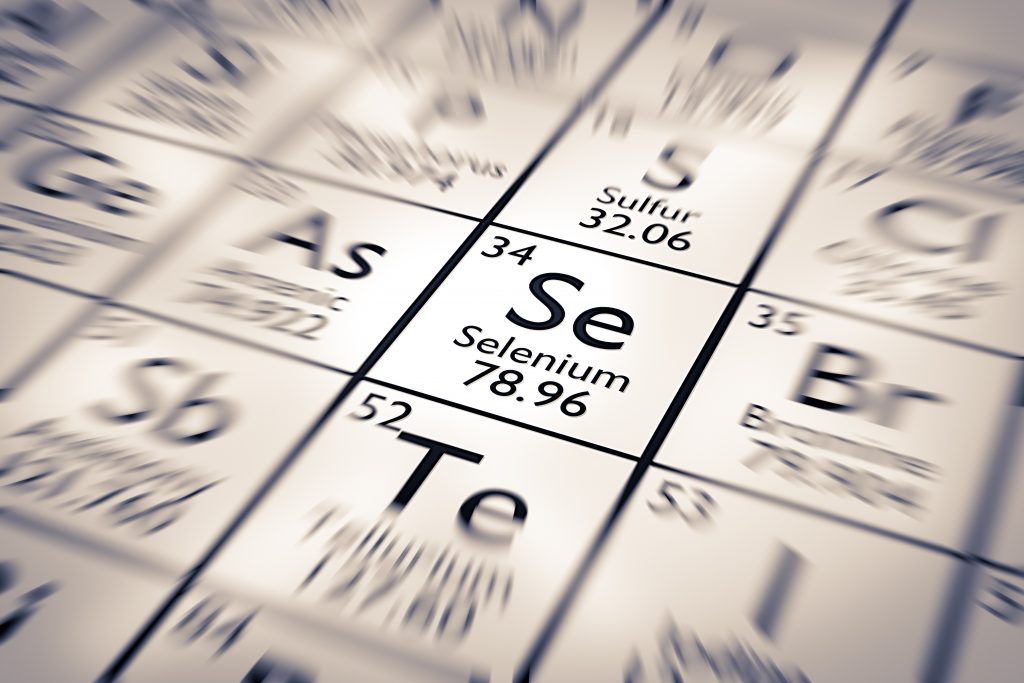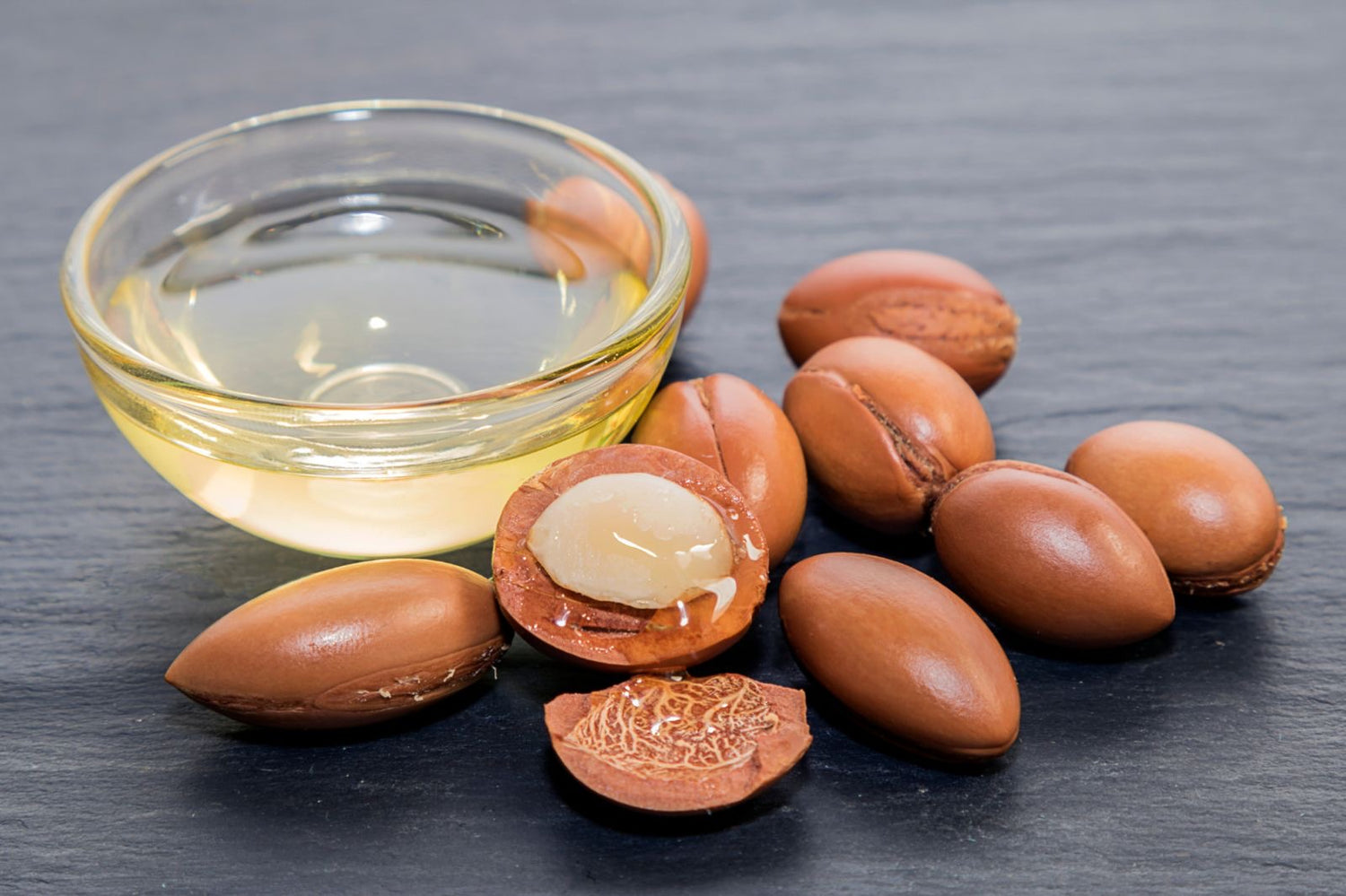What is Selenium?
Is an essential trace element that our bodies need to conduct numerous processes, including normal and healthy hair growth. We get most of our selenium from dietary sources. When this mineral is deficient, various health disorders can develop, including hair loss. Likewise, excessive amounts can lead to other types of ailments. These phenomena obviously highlight how important it is to maintain optimal and balanced selenium levels for our hair and general health. But rather than simply accepting this information at face value, here is a deeper science-based look at why this is the case.

Playing a vital role in hair health is selenium, the 34th Chemical Element of the Mendeleev Periodic Table
Dietary Selenium, From Nature's Soil to Its Usage In Our Bodies
Selenium comes from the soil, which grows our food, as well as water. The mineral is then taken up by plants and converted to a new, organic form called L-selenomethionine, an amino acid that can be ingested and utilized by humans and animals. In addition, it oxidizes quite readily in our bodies. This property allows it to easily reduce and neutralize free radicals, which damage our cells.

Eating foods high in selenium include brazil nuts, tuna, shrimps, beef, liver, mushrooms, pumpkin seeds, sunflower seeds, buckwheat, oatmeal, almonds, and eggs could contribute to healthy hair growth.
Good food sources of selenium include:
- Whole grains
- Brazil nuts
- Brown rice
- Sunflower seeds
- Spinach
- Lentils
- Oatmeal
Yet, the soil concentration availability of selenium varies all across the world. This, of course, affects how much of this mineral we can get from dietary sources. For example, according to Harvard Health, the richest selenium soils in the United States are found in Nebraska, South Dakota, and North Dakota. On the other hand, soils in China and Russia tend to be low in selenium. During the 1970s, deficiencies of this mineral resulted in widespread cases of Keshan’s Disease. The name derives from Keshan County of Heilongjiang province, Northeast China, where it was first described. The Chinese government then provided dietary supplements of selenium which lowered these incidences.
Selenium deficiencies can also arise when our blood is not able to absorb enough of this mineral. Possible reasons why this occurs include:
- The use of birth control pills
- Smoking
- Alcohol
Low selenium may result in hair loss, fatigue, and concentration difficulties.
Within our bodies, selenium is then used to make a class of compounds called selenoproteins responsible for functions like synthesizing DNA, producing thyroid hormones, protecting our tissues from oxidative damage, and more. In addition, many of the proteins are enzymes that use selenium as an activating cofactor to catalyze biochemical reactions. Put another way, a severe reduction or lack of this mineral would slow or halt many of the processes we rely upon to maintain our health.
Selenium plays a critical role in the production of our thyroid hormones which regulate our hair growth cycles. In fact, no other organ in our bodies contains as much selenium as the thyroid gland. Selenium also supports the white blood cells of the immune system to fight infections. And it is needed to activate many physiological enzymes which act as antioxidants. Some studies are even finding that selenium may also exert anticarcinogenic benefits.
Selenium As A Necessary Mineral For Healthy Hair

Thyroid hormones, which require selenium, are necessary for normal hair growth.
When a doctor investigates the cause(s) of a hair loss condition, they will check to see any underlying medical conditions at work. A rather common one includes thyroid imbalances (i.e., hypothyroidism and hyperthyroidism), commonly associated with telogen effluvium hair loss. However, once placed on a thyroid medication prescribed by their doctor, many patients can soon see improved hair growth.
So how exactly do our thyroid hormones regulate normal hair growth cycles? Do they work through a direct or indirect relationship? Here are a couple of research studies that help provide answers to these questions.
In one study, scientists observed genetically altered mice have missing thyroid hormone receptors in their skin [1]. They concluded that thyroid hormones emit signals that regulate the activities of stem cells found in the hair follicle bulge. These stem cells are responsible for our keeping our hair cycles going. The signaling of thyroid hormones mobilizes stem cells out from the follicle bulge, facilitating hair growth processes. This study also notes that mice without skin thyroid hormone receptors show defects in hair growth and epidermal production, and wound healing.
Researchers studied human hair follicles isolated from women undergoing facelift surgeries [2]. They discovered that thyroid hormones directly target the follicles, prolong the anagen phase, stimulate cell division of hair matrix keratinocytes. In addition, these hormones also promote hair pigmentation and downregulate apoptosis.

Selenium activates antioxidant enzymes in the body, which neutralize free radicals that age our hair follicles and other structures.
In one review concerning the nutritional needs of menopausal women suffering from hair loss, the authors cited selenium as a group of minerals that significantly influence hair growth [4]. Others include zinc, iron, copper, silicon, magnesium, and calcium. The review explains that the hair follicles uptake selenium, along with other trace elements from the blood. They then incorporate the mineral into the hair matrix structure during the process of keratinization.
A study where researchers observed infants suffering from selenium deficiencies noted that hair loss was one of the key symptoms that resulted in all six subjects [5]. Others included growth retardation and pseudo albinism.
Besides its internal roles in the biological processes of our bodies, topical selenium also plays an important role by killing the fungal organism which causes dandruff. For this reason, selenium sulfide is often used as the main active ingredient in many dandruff treatments. In addition, microbe proliferation in our scalp is undesirable due to skin flaking and inflammation, which occurs because the immune system tries to eliminate these organisms and damages our hair follicles in this process.
Other Benefits of Selenium For Our Health

Balanced selenium levels, along with other nutrients, keep our hair and bodies in top-notch shape.
Recent studies are investigating the possibility that selenium may offer protective benefits for our skin against UV-induced damage. Unfortunately, findings are not yet conclusive at this point. But the concept of an internal form of sunscreen has been a source of fascination for scientists. Nonetheless, the antioxidant-promoting activities of selenium still contribute to anti-aging effects for the skin and other tissues.
Selenium has also gained enormous attention due to evidence pointing to the lowered risk of certain types of cancers. For example, one review of 69 studies showed that 350,000 individuals with high blood concentrations of selenium had much lower incidences of certain cancer types such as prostate, lung, breast, and colon cancer.
Also, the effects of oxidative stress are not just limited to the general signs of aging. Free radical damage can be severe enough to affect our mental functioning. Oxidative stress is associated with neurological conditions like Alzheimer's, multiple sclerosis, and Parkinson’s disease. For example, a few studies discovered that Alzheimer's patients had lower-than-average selenium levels in their blood.
In one published study, patients with mild forms of cognitive impairment were given one Brazil nut a day, a food source rich in selenium. To the researchers' surprise, these individuals showed various signs of improvement across different mental functions, including verbal fluency.
The benefits offered by selenium for our hair and bodies are certainly remarkable. However, we should always keep in mind that our health depends on a wide, comprehensive range of different nutrient types, working together, not just one. Therefore, the right balance, which can be made available through some oral or topical hair products, is essential for produce the most optimal results.
Frequently Asked Questions - Selenium Benefits For the Hair
How much selenium should I be taking for better hair growth and my general health?
The standard recommended daily intake of selenium is 60 micrograms for men and 53 micrograms for women. Higher dosages are permissible under the guidance of a physician. For example, in a study on prostate cancer, subjects took 200mcg of selenium a day. However, the safe upper limit has been defined as 400 micrograms a day for adults. Excessive selenium can result in a condition called selenosis, marked by hair and nail loss, bad breath, fatigue, and damage to the nerves.
Is selenium better than biotin for the hair?
Although biotin has developed a strong reputation as a hair supplement vitamin, its benefits are apparent when it is deficient to start with. Selenium, biotin, and other nutrients are needed in the right balanced dosages to produce long-term benefits for the hair and other areas of our health.
References
[1] Constanza Contreras-Jurado et al., Thyroid hormone signaling controls hair follicle stem cell function, Molecular Biology of the Cell Vol. 26, No. 7 [2] Nina van Beek et al., Thyroid Hormones Directly Alter Human Hair Follicle Functions: Anagen Prolongation and Stimulation of Both Hair Matrix Keratinocyte Proliferation and Hair Pigmentation, Journal of Clinical Endocrinology & Metabolism 93(11):4381-8 · September 2008 [3] Ujang Tingg, Selenium: its role as antioxidant in human health, Environ Health Prev Med. 2008 Mar; 13(2): 102–108. [4] Zuzanna Sabina Goluch-Koniuszy, Nutrition of women with hair loss problem during the period of menopause, Prz Menopauzalny. 2016 Mar; 15(1): 56–61. [5] Kouji Masumoto MD et al., Clinical features of selenium deficiency in infants receiving long-term nutritional support, Volume 23, Issues 11–12, November–December 2007, Pages 782-787




